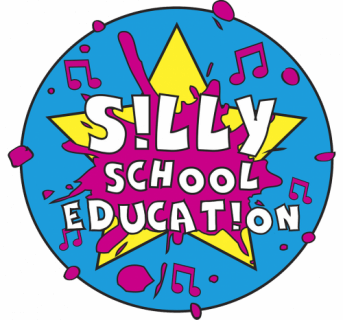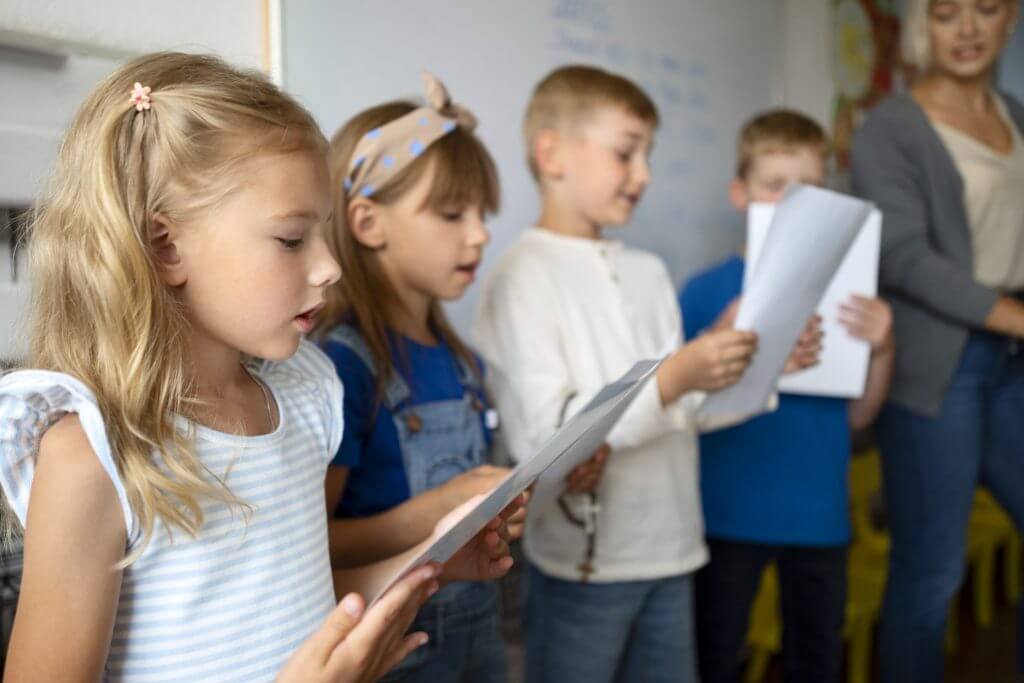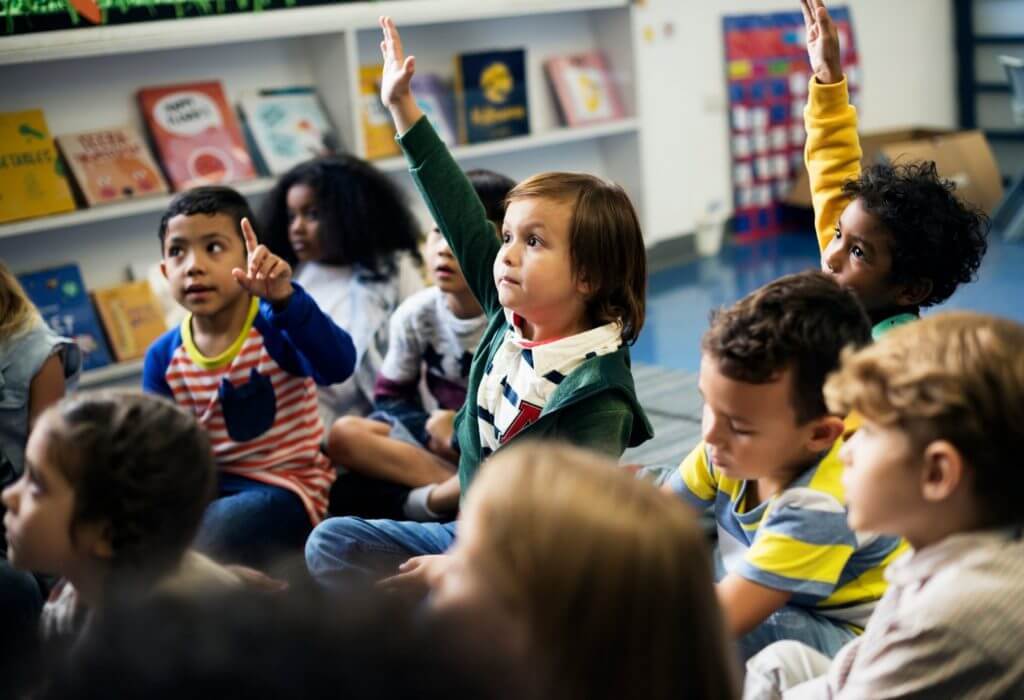5 Reasons Music is Crucial in Education: Educational Songs for Elementary Schools
Music has been an integral part of human culture for millennia, enriching our lives and inspiring creativity. Beyond its artistic and entertainment value, educational songs for elementary schools play a profound role in education. As schools strive to provide well-rounded and holistic learning experiences, the inclusion of music in the curriculum becomes paramount. In this blog, we will explore five compelling reasons why music is crucial in education and how it positively impacts students’ academic, social, and emotional development.
Cognitive Benefits of Educational Songs in Elementary Schools:
Extensive research has continually underscored the profound cognitive benefits that educational songs offer to young students within elementary schools. The impact of music education on cognitive development extends far beyond the realms of artistic expression, encompassing a diverse array of cognitive faculties that significantly contribute to students’ overall academic growth and intellectual prowess.
At the core of the cognitive advantages lies the intricate neural processes that are set in motion when students engage with educational songs. Learning to read music and master various musical instruments demands meticulous attention to detail, keen observation, and the ability to decipher complex musical notations.
These mental exercises nurture and refine memory capabilities, allowing students to retain information more effectively across various academic disciplines. As students grapple with intricate musical compositions, their working memory undergoes a notable improvement, thereby enhancing their capacity to process and manipulate information in real-time.
In addition to bolstering memory, educational songs for elementary schools act as powerful stimulants for attention and concentration. Children exposed to musical education are required to remain focused during their practice sessions, rehearsals, and performances. This sustained attention to musical nuances effectively transfers to other academic pursuits, sharpening their ability to concentrate on tasks and assignments in the classroom. Furthermore, this enhanced focus empowers students to minimise distractions and optimise their learning experience, ultimately fostering a more efficient and productive academic journey.
Moreover, music education has been positively linked to improvements in problem-solving skills. By grappling with intricate musical compositions and identifying the underlying patterns and rhythms, students naturally develop an analytical mindset that transcends the boundaries of music itself. This analytical acumen extends to various problem-solving scenarios encountered in everyday life and other academic domains, enabling students to approach challenges with a heightened sense of creativity and adaptability.
Beyond its direct impact on memory, attention, and problem-solving, music education has also shown to have a significant influence on students’ mathematical and language skills. The fundamental principles of rhythm, timing, and beat in music are inherently mathematical in nature, requiring students to subconsciously grasp numerical concepts to produce harmonious melodies. Through this musical exploration, students unconsciously strengthen their mathematical foundations, which positively impacts their mathematical aptitude in other areas of the curriculum.
Language acquisition and linguistic abilities are also enriched through musical education. The process of learning lyrics, understanding different vocal techniques, and expressing emotions through song enhances language skills, especially in terms of pronunciation, vocabulary, and phonological awareness. The rhythmic nature of language in music also contributes to improved language fluency and rhythmical patterns, leading to better language comprehension and communication.
Furthermore, music’s unique capacity to activate both hemispheres of the brain serves as an essential driver of comprehensive cognitive development. As students engage in various musical activities, their brain connectivity is remarkably enhanced, facilitating the efficient transfer of information between different brain regions. This increased connectivity not only enhances cognitive function but also strengthens the neural pathways involved in creativity, emotional processing, and critical thinking.
In conclusion, the cognitive benefits of educational songs in elementary schools are diverse and profound. Beyond their melodious allure, these songs serve as catalysts for cognitive growth and intellectual advancement. From fostering memory retention, improving attention and problem-solving skills, to nurturing mathematical and language abilities, music education creates a dynamic cognitive framework that equips students with a versatile set of skills applicable across various domains.
The holistic activation of both hemispheres of the brain further underscores the transformative power of music in shaping well-rounded and intellectually enriched young minds. As educators and policymakers continue to recognize the instrumental role of music in cognitive development, the integration of educational songs in elementary school curricula will undoubtedly pave the way for a generation of intellectually adept, creative, and adaptable learners.
Emotional Expression and Well-being:
Educational songs for elementary schools serve as a universal language that enables students to express their emotions and thoughts creatively. Playing instruments, singing, or composing music allows students to communicate their feelings in a safe and constructive way. This emotional outlet can be particularly beneficial during challenging times, reducing stress and anxiety. Engaging with music can uplift moods, promoting a positive learning environment and boosting overall well-being.
Discipline and Focus:
Learning through educational songs requires dedication and consistent practice, instilling discipline and focus in students. Mastering an instrument or honing vocal skills demands patience and perseverance. Students learn to manage their time effectively, set goals, and work diligently to achieve them. These qualities extend beyond music education and positively influence other academic and extracurricular pursuits, contributing to well-rounded personal growth.
Collaboration and Social Skills:
Music education with educational songs provides numerous opportunities for collaboration and teamwork. Participating in choirs, bands, or orchestras encourages students to work together towards a common goal. They learn to listen actively, adapt to others’ rhythms, and develop empathy for their fellow musicians. The sense of belonging and camaraderie nurtured in musical ensembles fosters a supportive social environment, nurturing essential social skills that students can carry into their adult lives.
Cultural Appreciation and Diversity:
Educational songs from different cultures in the curriculum play a transformative role in fostering cultural appreciation and understanding among students. The inclusion of diverse musical styles and genres not only broadens their horizons but also cultivates a sense of open-mindedness and tolerance. When students engage with music from various cultures, they are exposed to a rich tapestry of traditions, customs, and histories that shape the human experience. This exposure allows them to connect with different worldviews, creating a deep sense of empathy and respect for the diversity that exists beyond their immediate surroundings.
As students explore the historical and cultural contexts of music, they gain a deeper understanding of the sociocultural influences that shape artistic expression. For example, traditional folk songs can provide insights into the values, beliefs, and rituals of a particular community. Similarly, classical compositions may reflect historical events or the prevailing ideologies of a bygone era. By delving into these cultural contexts, students develop a more profound appreciation for the interconnectedness of music with the larger human story. You can find thousands of educational songs for elementary schools online via Youtube or using Silly School Education TV.
Music is Crucial in Education: Educational Songs for Elementary Schools
Educational songs for elementary schools hold profound significance in the realm of education, transcending their delightful melodies and harmonies. Recognised as powerful tools, these melodious compositions possess the unique ability to shape young minds, contributing to the holistic development of students in myriad ways.
Firstly, music has been scientifically proven to be a catalyst for cognitive growth and enhanced intellectual abilities in students. Engaging with educational songs and actively participating in music classes stimulate various areas of the brain, boosting memory retention, critical thinking, and problem-solving skills.
As students learn to read sheet music, identify rhythmic patterns, and master the techniques of playing instruments, they develop a deeper understanding of mathematics and language arts. This cross-disciplinary connection strengthens their academic performance across subjects, empowering them with versatile skills essential for success in the modern world.
Moreover, educational songs for elementary schools serve as a gateway for emotional expression and well-being, offering a safe haven for students to unleash their innermost feelings. Through singing, playing instruments, or even composing their songs, children find a powerful medium to communicate their emotions constructively. This emotional outlet proves especially vital during challenging periods, providing them with solace, reducing stress, and nurturing resilience. By fostering a supportive environment for emotional growth, music education cultivates emotionally intelligent individuals who can empathise with others and effectively manage their emotions.
The discipline and focus instilled in students through their musical endeavours leave a lasting impact on their academic journey and beyond. Practicing and mastering musical skills demand dedication and consistent effort, teaching children the virtues of perseverance and time management. As they set ambitious goals, work diligently to achieve them, and celebrate their progress along the way, students are equipped with the tenacity to excel in any field they pursue. The transferable nature of discipline from music education to other academic and extracurricular pursuits makes it an invaluable asset in shaping well-rounded personalities.
Beyond individual growth, the collaborative nature of music education hones social skills and nurtures a sense of community among students. Participating in choirs, bands, or orchestras provides a platform for children to work together towards a shared artistic vision. Using educational songs for elementary schools they learn to actively listen, harmonise with others, and adapt their tempo to create a synchronised masterpiece. Such experiences instill teamwork, cooperation, and empathy among students, laying the foundation for building strong and interconnected communities in their future endeavours.
The inclusion of diverse cultural aspects in music education amplifies its impact, promoting appreciation and understanding among students. As they explore educational songs from different cultures, students gain valuable insights into the customs, traditions, and histories that shape societies worldwide. Through this cross-cultural journey, they develop a global perspective that embraces diversity and dismantles stereotypes, fostering respect and celebration for the richness of humanity’s tapestry.
In the ever-evolving landscape of education, policymakers and educators must recognise the indispensable role of music in nurturing well-rounded, compassionate, and intellectually enriched individuals. By nurturing a love for music through educational songs, schools not only equip their students with creative confidence but also create a lifelong passion for learning and exploration. As these musically nurtured individuals venture into the world, they are poised to face its challenges with resilience, creativity, and a profound appreciation for the transformative power of education.
Hence, integrating music into the curriculum is not just a choice but an imperative step towards nurturing a generation of compassionate and empathetic global citizens, equipped to contribute positively to society. Our educational songs for elementary schools will help your class learn faster and with a smile on their face.
Links to further information where you can find out the research behind why educational songs for elementary schools are so important:
- Google Scholar: https://scholar.google.com/
- PubMed: https://pubmed.ncbi.nlm.nih.gov/
- JSTOR: https://www.jstor.org/
- ScienceDirect: https://www.sciencedirect.com/
- Frontiers in Psychology: https://www.frontiersin.org/journals/psychology
For hundreds of Educational Songs for Elementary Schools Click HERE
Silly School Education : Educational Songs for Elementary Schools



